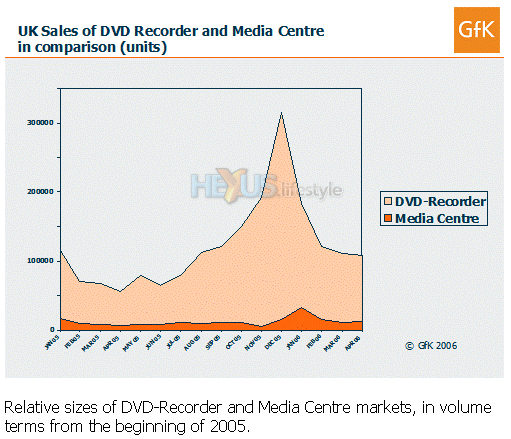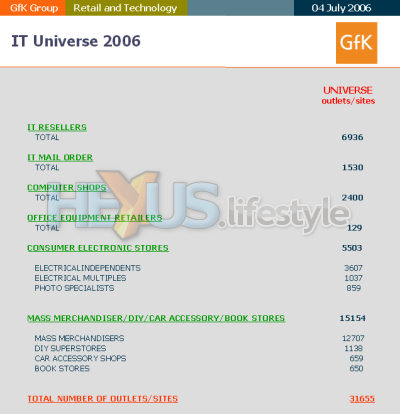
Market research specialist GfK says that despite the ever-increasing number of media-centre PCs on offer - and the excitement they're causing within the industry - sales volumes in the UK are small because consumers remain uneducated and unconvinced.
More worrying still, GfK warns that media-centre PCs, which it says have typically only been bought by early adopters, could be killed off by the next generation of media gateways that allow streaming over home networks from existing PCs to existing TV sets and AV systems.
This fate can be avoided, it reckons, but not unless makers and sellers of media-centre PCs can quickly convince the public of their worth by educating people - in store - on what they can do with them, and also make them more affordable.
In its latest report, the company gives an overview of the feature-set of MC PCs, saying they are:
Adapted for playing music,
surfing the
internet and watching DVDs; controlled by a remote control on
the sofa
rather than a keyboard; and allow users to easily download
films, sport and television programmes.
However, it maintains that,
This range of
entertainment in one box is not only an advantage for the
product, but also one of its downfalls.
According to GfK’s IT Business
Group Director Jean Littolff,"Consumers need to be
instructed on how
to use Media Centres to get maximum benefit. They cannot simply be sold
as a box in a store if retailers hope to penetrate beyond the early
adopters. Even further drops in prices alone would not have
the same
effect of an in-store display of the entire set-up."
GfK doesn't explain from what sorts of retail outlets its stats are derived (we'd guess High Street stores but are trying to check) - and that could be very important to any evaluation of their validity. Even so, the figures could start alarm bells ringing across the industry. The company says that only 120,000 media-centre PC were sold in the UK in the last 12 months. That does represent a considerable sum of money - around £100 million - but, according to GfK, just a four per cent share of the total sales volume for desktop computers.
The number of models available is said to have doubled to over 150 in the last year but only resulted in a modest increase in sales. On the upside, GfK reckons that media-centre PCs are growing by 56 per cent in volume while the overall desktop market is decreasing by 30 per cent year-on-year.
Unfortunately, it attributes much of this growth to retailers that dropped prices of MC PCs below £600 in January to drive volumes of sales, "presumably in an effort to shift unsold holiday-season stock".
Highlighting just how poorly media-centre PCs have performed, GfK contrasts sales volumes with those for DVD recorders - over 300,000 of which were sold in December alone.

But all is not doom and gloom. A massive opportunity is reckoned still to exist. Jean Littolff says,
"With some clever
marketing, Media Centres
could become as familiar to consumers as iPods. If the industry acts
quickly, it may stave off the threat to Media Centres, [from] the next
generation of media gateways, which allow streaming from existing PCs
to existing home entertainment systems. Media gateways currently
available have sufficient bandwidth for the streaming of music, but
once the new European standard is ratified, now expected for early
2007, streaming of video content will be feasible, and if Media Centres
are not entrenched in the market by then, they may never be."
What GfK doesn't mention directly is the many millions of dollars (and pounds) that the computer industry is expecting Intel to spend throughout this year - and beyond - promoting its own media-centre platform Viiv.
It is possible, we believe, that Intel's millions will create the awareness and demand that GfK says is needed to save media-centre PCs from oblivion. And, given the massive success that a big pot of money had in creating demand for Intel-based Centrino laptops, we'd not rule out ViiV as a saviour.
GfK also doesn't mention the competing AMD Live media-centre concept. Although AMD won't throw anything like as much money at Live as Intel will at Viiv, that smaller sum might help, too.
Alternatively, the conflicting messages that the two companies will be putting out may simply serve to confuse consumers who are in need of education if media-centre PCs are to become the norm, rather remain than the province of technically-aware early adopters.
Intel, in effect, is saying, "buy MC PCs with Intel CPUs and chipsets to get the best media-centre experience". AMD is saying, defensively and with no great clarity as yet, "you can buy AMD and still get a great media-centre experience".
So what are your thoughts about media-centre PCs?
Is GfK correct in saying that they've been over-priced and not properly explained. And are, they, do you think, likely to be picked off by next-gen media gatways if the industry doesn't cut prices and properly educate consumers?
And does this education-programme necessarily have to be in-store?
Or do you think that the massive amounts of cash that Intel is set to be spending on ViiV will do the trick and also be sufficient to drown out any confusion caused by AMD Live?
As always, we're keen to hear your opinions over in the HEXUS.community.
Update - July 04, 13:10
GfK got back to us today with the answers to some questions we believed were outstanding from our original news piece.
This is what the company said:
With regard to media gateways:
* Most of the products on the market are using the 802.11g standard, which handles well music streaming, but does not really have adequate bandwidth for video streaming. There are some products on the market that allow for video streaming, but these are in a minority, not yet selling in substantial volumes and are generally of the pre-n standard, which may or may not be compatible with the n standard when agreed, thus consumer wariness.
* The standard to be ratified end of this year / beginning of next is the 802.11n standard.
With regard to the universe of GfK's IT data:
GfK's data is based upon sales out of B2B and Retail. Attached is an explanation of our channel set up [see the chart of GfK's IT Universe below - Ed]. We are reporting 100% of the channels we are covering (ITMO +IT Reseller + Retail), basically all indirect sales transaction.
We are not covering online transactions. The coverage is 65% (indirect sales vs total market). In the UK it is highly impacted by Dell, which deals mostly directly. Hence it is excluded, also the direct sales of vendors.
With regard to Intel Viiv and AMD Live:
Of course we were aware of some industry activities but the picture has been a bit blurry. That's why we decided not to mention initiatives. I agree that concentrated actions will impact the market like we saw in home computer initiative (HCI) last year for example.
We are still at the very early beginning of media center adoption. A comparison with Centrino is misleading [which we made in our queries to GfK - Ed] because it was designed to target the educated majority.
Within media center we are still in the stage of early adopter.
To make the transition, the investment in consumer education at the point of sale has to increase. Still the majority of end user do not know what a media center is,
what it combines and what the USP of these devices are. So why would they buy one? If you go to other European countries they have dedicated merchandising concepts within the retailer shops, explaining exactly the function and value of media center.
If the retail would invest more in this kind of marketing infotainment they would easier explain the two concepts [Viiv and Live - Ed]. AMD wants to connect existing devices under the TV, Intel wants to substitute. In my opinion these are not two rival standards, both have a dedicated market potential.
* Most of the products on the market are using the 802.11g standard, which handles well music streaming, but does not really have adequate bandwidth for video streaming. There are some products on the market that allow for video streaming, but these are in a minority, not yet selling in substantial volumes and are generally of the pre-n standard, which may or may not be compatible with the n standard when agreed, thus consumer wariness.
* The standard to be ratified end of this year / beginning of next is the 802.11n standard.
With regard to the universe of GfK's IT data:
GfK's data is based upon sales out of B2B and Retail. Attached is an explanation of our channel set up [see the chart of GfK's IT Universe below - Ed]. We are reporting 100% of the channels we are covering (ITMO +IT Reseller + Retail), basically all indirect sales transaction.
We are not covering online transactions. The coverage is 65% (indirect sales vs total market). In the UK it is highly impacted by Dell, which deals mostly directly. Hence it is excluded, also the direct sales of vendors.
With regard to Intel Viiv and AMD Live:
Of course we were aware of some industry activities but the picture has been a bit blurry. That's why we decided not to mention initiatives. I agree that concentrated actions will impact the market like we saw in home computer initiative (HCI) last year for example.
We are still at the very early beginning of media center adoption. A comparison with Centrino is misleading [which we made in our queries to GfK - Ed] because it was designed to target the educated majority.
Within media center we are still in the stage of early adopter.
To make the transition, the investment in consumer education at the point of sale has to increase. Still the majority of end user do not know what a media center is,
what it combines and what the USP of these devices are. So why would they buy one? If you go to other European countries they have dedicated merchandising concepts within the retailer shops, explaining exactly the function and value of media center.
If the retail would invest more in this kind of marketing infotainment they would easier explain the two concepts [Viiv and Live - Ed]. AMD wants to connect existing devices under the TV, Intel wants to substitute. In my opinion these are not two rival standards, both have a dedicated market potential.
HEXUS.links
HEXUS.community - discussion thread about this article
GfK UK - home page
Intel ViiV - Viiv home page
AMD Live - home page














